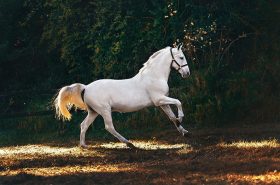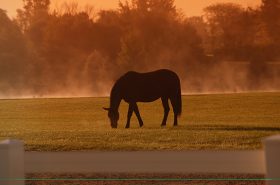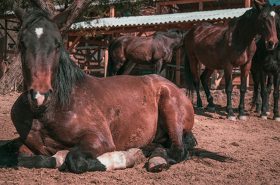There are numerous products on the market that are made to help eliminate flies. But which one is the best for your horses?
Once we look at some of the most popular options, you will surely have a better handle on what may be your best options to relieve your horses. Let’s start with the most simple ways to help with this pesky summer problem.
Fly Pest Prevention
One of the easiest ways to help prevent flies is to keep horse stalls clean. If possible, the stalls should be cleaned every day. This not only reduces your time spent cleaning, but your horse will appreciate that there is less manure in the stall that attracts flies. When you remove the manure, be sure to keep it away from both the barn and any riding areas. In some areas, manure needs to be removed frequently. Check your local ordinances or local agricultural extension for further information about your area.
If you have large pastures away from the barn, spreading manure may be an option for you. It fertilizes your resting pastures and helps to eliminate manure piles that are much more attractive to flies.
Reducing standing water around the barn will help to keep both flies and mosquitoes at bay. For horse owners, it is especially important to keep mosquitoes away due to the West Nile Virus. It’s advised you contact your local Veterinarian for yearly vaccinations.
Within your barn, it’s important to dispose of waste containers regularly and keep your barn free of clutter. Be sure not to leave apples or other perishable foods in your barn where your horses are located. Additionally, tight-fitting lids should be kept on grain bins, especially if you are using sweet feed with molasses. Flies are notorious for being attracted to anything that is sticky and sweet.
Outside, keep the tall grass mowed and trimmed, as flies like to breed in grassy areas. You will also find that the mosquitos flourish in unmowed areas. The time you put into keeping your surrounding barn areas well mowed will give your horses and barn a better fighting chance to win the war with flies.
Now that we have looked at the obvious ways to help to keep flies at bay around your farm, let’s take a look at other products that are available to further help you.
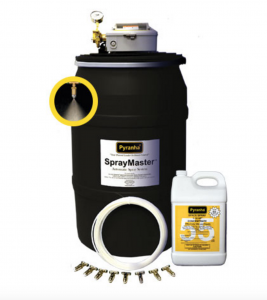
Fly spray systems can be a great investment for you and your horses’ peace of mind. Spray systems are installed overhead in barns, aisles, and areas where your horses will be frequently located. A timed mist lightly sprays over your horses; you will no longer need to remember to hand-spray horses while they are in the vicinity of the misters. Horse-safe insecticides are used with the systems. The fly spray systems most definitely can make your barn or indoor much more comfortable.
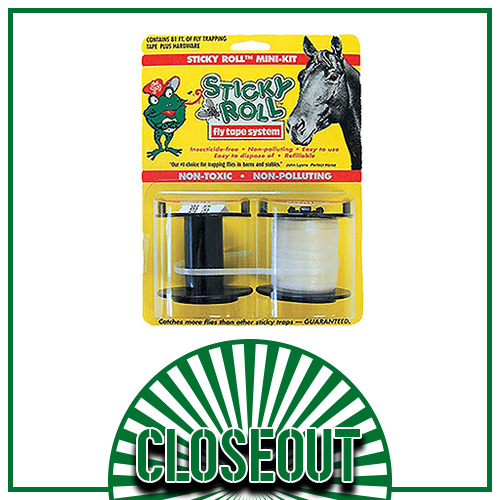
Fly traps and sticky tapes ‘catch’ flies as they are attracted to the scents of the products. You can hang them throughout the barn, be sure to empty or discard the product and start again with the ‘catching’ process. Be sure to not hang these products within your horses reach or stretch of their heads. These items can be a help in areas where fly populations are not great, but if a potential heavy fly problem exists, you will need to use and purchase more of these products more frequently.
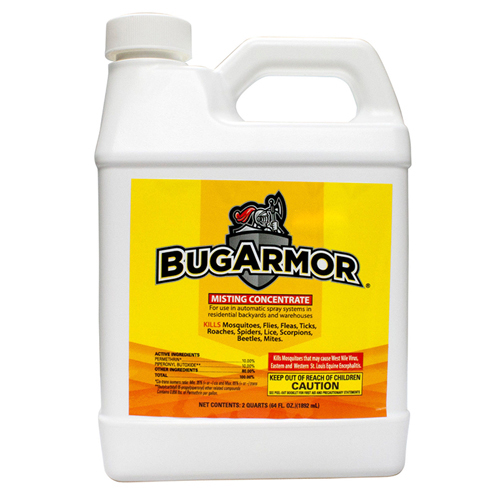
Fly sprays can help your horses from continual stomping and tail ‘swishing’’ for shorter periods of time. Depending on hot or rainy your weather is, how much your horse sweats, or how long you will be riding determines how often you will need to reapply. Find a good fly spray product that repels safely; some products are organic while others are not.
Fly masks and sheets can cover the majority of the horse’s body, keeping flies from biting as easily. Since flies do not land directly on your horse, masks and sheets give some relief from the horse feeling them. Check your horse throughout turnout to make sure they are not sweating or irritated from the masks or sheets. New products may cause rubbing or irritation to your horse.
Wraps can be used to keep flies away from horses’ legs. Fly wraps (worn like shipping boots) are made from a breathable material. Just be sure to daily check any materials that come in direct contact with your horses’ skin to avoid irritation.
Whatever method you choose to use, remember nothing will completely rid your barn of flies. Try different methods or products to determine what works best for you and your horses. Flies are just a daily reminder that summer is here.

